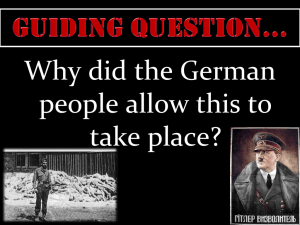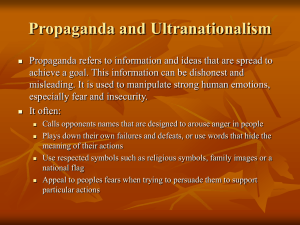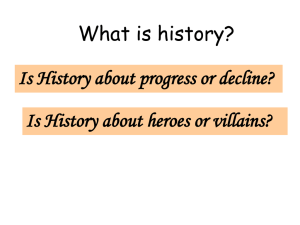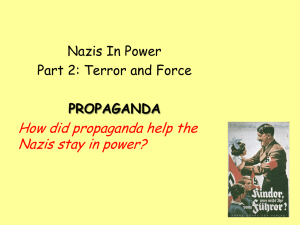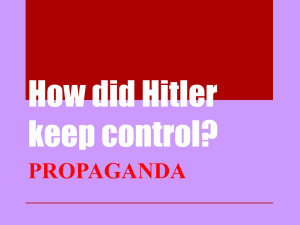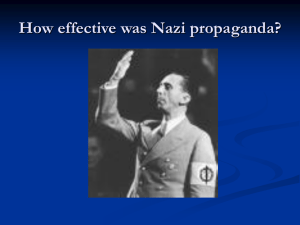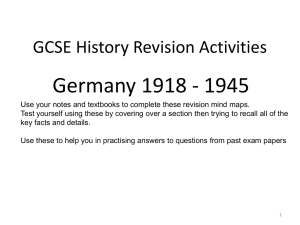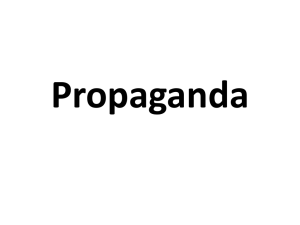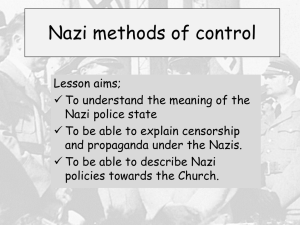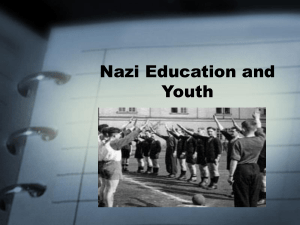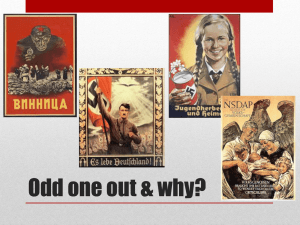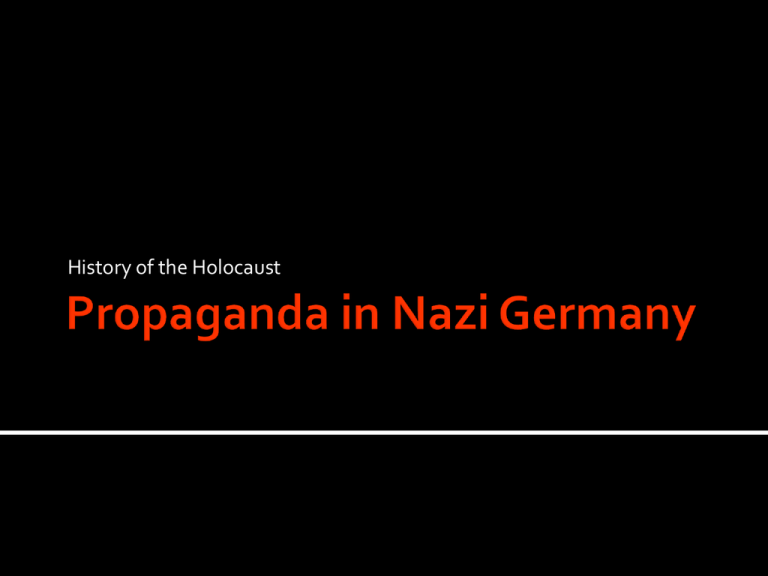
History of the Holocaust
Propaganda is the
use of the Media to
promote one point of
view.
Propaganda is
brainwashing the
public, convincing
them of an
ideological viewpoint.
What are some ways the government could
brainwash the public?
Minister of Public
Enlightenment
Responsible for
running the Nazi
Propaganda
machine
Tasked with
ensuring views of
Nazi party were
persuasive.
Media
Using latest
technology,
loudspeaker, slideshows,
films
Traditional music played at
meetings, message of
harmony and unity
The Nazis recognised the value of
the media.
Nazis used aggressive advertising to
promote Nazi ideology
Goebbels was in charge of
enlightening the German public.
1.
2.
3.
4.
5.
6.
Anti-Semitism (anti-Jew)
Militarism (uniforms; army)
Nationalism (pride in Germany)
Supremacy of the Aryan race
Cult of the Fuhrer (Hitler focal point of
nation; god-like figure)
Traditional German ‘Volks’ culture
Posters - cheap &
easy to distribute
Placed in
prominent
positions
Constant reminder
of Nazi ideology
Examples of Nazi Posters
1) The Peoples Receiver – limited range in order to
only hear Nazi broadcasts (could not pick up foreign
broadcasts)
-All news broadcasts came through the Nazi Office of
Propaganda
-Between 1932-9 the number of families with radios
rose from 25% to 70%
-Goebbels described radio as “the spiritual weapon of
the totalitarian state”
2) Hitler’s Speeches
-Hitler is considered to have been one of the greatest
public speakers of all time
• Film was used to show Hitler in a positive light
as often as possible
•Film going quadrupled between 1933 and 1942
•Over 1000 films produced during the Third
Reich
•Nazis often used newsreels shown before the
start of feature films
•The Nazi’s commissioned several films, each
carefully portraying a certain image
1935 –Triumph of the Will –film that chronicles Nazi rally
Censoring newspapers ensures that only the news you want
people to read is available to the public
October 1933 new law made editors responsible for
infringements of government directives
Clause 14 obliged editors to exclude anything ‘calculated to
weaken the strength of the Reich’
Treason to spread false news or rumours
Many publications banned.
…………..1933 there were 4,700 daily newspapers, 3%
controlled by NSDP (Nazi party)
…………..1944 there were only 997 daily newspapers, 82% of
which were controlled by NSDP.
Eventually, directly or indirectly, the Press was
controlled by Eher Verlag (Nazi publishing house)
RMVP (Ministry for Enlightenment and
Propaganda) told editors where to place articles
Nazi Press Agency supplied estimated 50% of
content
From 1933 all editors and journalists had to be
accredited by Goebbels
In 1933 there were book burnings
at the universities of Berlin and
Nuremberg
10 May 1933 central square in
Berlin the largest book burning
event took place
Raids on public and private
libraries
Goebbels wanted to eradicate
‘overstated Jewish intellectualism’
Books burned which were Jewish,
socialist or pacifist by nature
Censorship prevents people from hearing
anyone else’s ideas
Do you think censorship exists in today’s
world?
In 2002, China banned the search engine Google.
Can you think why?
Goebbels aimed to ensure nobody could
read/see anything that was
hostile/damaging to Nazi party
He worked with SS & Gestapo to achieve
this aim
What part did the Gestapo/SS have to
play in censorship?
The Terror State
Secret police called the
Gestapo would spy on
and arrest enemies of
the state.
SS were responsible
for running the
concentration camps.
Everyone was scared of
being arrested by the
Gestapo and being put in
a concentration camp.
Propaganda
Mass Rallies, Posters
and Propaganda films.
Keeping
Control of
Germany
The Nazis controlled
and censored the radio
& newspapers.
Popularity
School children were
indoctrinated with Nazi
ideas at school.
Ripping up the
Treaty of Versailles.
Creating Jobs
Hitler Youth & the
Young Maidens.
Task:
Answer the following questions in full
sentences
1) What is propaganda?
2) What is censorship?
3) Construct a mind map showing
the different elements of Nazi
propaganda and censorship.
4) What effect did Nazi propaganda
have on the German population?
5)What was Nazi propaganda
designed to make Germans think
about the Nazis and about German
Jews?
Radio;
receiver;
Hitler’s
speeches
Nazi propaganda and censorship

